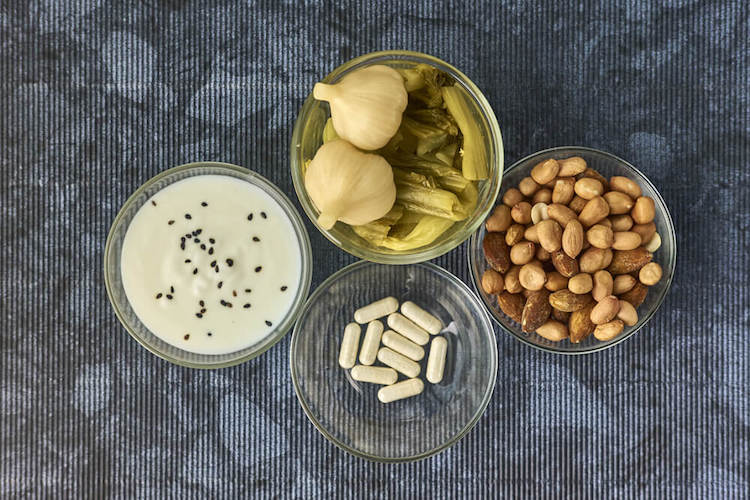
Probiotics benefits and the foods/supplements that carry them never really occurred to me until I was faced with a situation that brought me face-to-face with death.
If you’re here wondering whether probiotics benefits are everything they’re cracked up to be, then take this personal story as a resounding yes, but do consult with a doctor before moving ahead with your regimen.
Now that the disclaimer is out of the way, here’s what happened to me about six years ago.
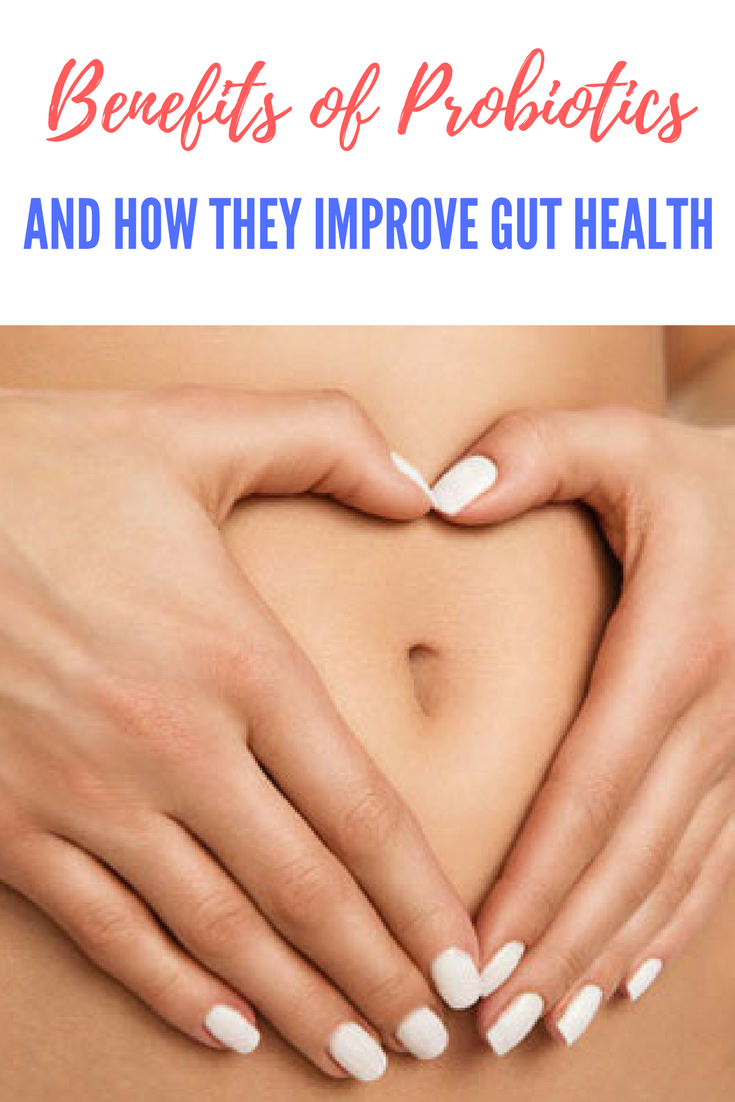
A Little Thing Called ‘C. Diff.’
Clostridium difficile, or “C. Diff.” as it is commonly referred to in the medical community, is Satan’s little way of bringing Hell to Earth courtesy your large intestine.
The Mayo Clinic defines it as “a bacterium that can cause symptoms ranging from diarrhea to life-threatening inflammation of the colon,” noting that it is an illness which “commonly affects older adults in hospitals or in long-term care facilities and typically occurs after use of antibiotic medications.”
The United States has about 500,000 reported cases of C. Diff. each year, and, the site notes, it is a problem spreading to other populations such as “younger and healthy individuals without a history of antibiotic use or exposure to health care facilities.”
I was 32 when I ran aground of it, and while there is still mystery surrounding how I might have contracted it, my situation at the time did fit in with the Mayo Clinic’s scenario in that my wife was a nursing student. It’s possible she brought it home from the hospital.
But in the next three months, I would care less about that and more about getting rid of it.
From Healthy and Active to Making Out a Will
When you’re in your early 30s, you start thinking about things you can do to be healthy, realizing that you’ve ridden the coattails of a teen/young adult’s metabolism as far as they’ll take you.
My journey led to ellipticals and treadmills and walking at the mall with a pedometer. I really thought I was on the right track.
Then, the cramping came. Next, the bloating. Finally, the mad rush to the bathroom for some of that aforementioned watery diarrhea — and did I mention “explosive”? — just in the nick of time.
Rinse and repeat 6-12 times per day virtually non-stop for a three-month period. That was my experience with C. Diff.
C. Diff. came with little warning, and once it was diagnosed, it was difficult to beat. Suddenly the guy who was excited about his health was squeezing in hand-scrawled last wills and testaments on a sheet of notebook paper in between his next trips to the bathroom.
During the Christmas season, my wife and I decided we would brave a day of Christmas shopping. We hit an outlet mall, and I literally had to go to the bathroom five times in less than an hour.
It was on that trip she thought of something that a) my (now ex) doctor should have told me about, and b) would help me kick the infection once and for all: Probiotics.
What Are Probiotics?
Probiotics are simply microorganisms which many believe have health benefits in humans and animals.
The problem with something like C. Diff. is that you can take a round of antibiotics specifically tailored to it, seemingly kill the stuff, and then have it come back with a vengeance a few days later.
C. Diff is sneaky and adaptive. You can think you’ve killed it, but you haven’t. Some of the surviving microorganisms lie in wait until you’re done with the antibiotic round, then they quickly repopulate.
I went through three different rounds of antibiotics myself before the wife finally suggested a probiotics supplement. We bought one over the counter on that same Christmas shopping trip.
I had given up on ever being well again, so figured there was nothing to lose.
What Do Probiotics Do?
With my fourth and final round of antibiotics, I started taking a refrigerated probiotic supplement. (I don’t remember the name, but I bought it from GNC. The ones at Walmart and Walgreens work fine, too.)
During my 10-day round of antibiotics, my digestive health improved significantly; soon I was taking it as a victory that my explosive diarrheas were down to once or twice per day.
However, I knew the moment of truth would be after the prescription was complete. Would continued consumption of the probiotic without the antibiotic manage to keep the bacterium from repopulating?
First, one day passed; then another and another. At this point, the diarrhea was gone completely. I continued taking the probiotics until my next appointment, where I gave what seemed like the umpteenth stool sample since the struggle began.
This time around, I got an all-clear.
I continued taking probiotics supplements for the next month and slowly weaned off.
Why did it work? The way my (new) doctor explained it was that the antibiotics were killing off most of the C. Diff., but not all of it.
Once the antibiotics round completed, my gut was clear of most bacteria, so a wiser form of C. Diff. was able to seize control of my intestines with no “good bacteria” there to stop it.
As a result, I found myself right back where I started from, but only in worse shape because the repeated occurrences were leading to more and more expensive antibiotics to keep the infection at bay.
It wasn’t that probiotics were able to “cure” my C. Diff., but they were integral to the process. By stuffing my depleted digestive tract with these good bacteria, the few remaining C. Diff. that the antibiotic left behind were unable to seize control and, I assume, died off on their own.
Or, maybe, they’re still in there, but they’ve been rendered impotent by reestablishing a good bacterial ecosystem.
I don’t know, and I don’t care. I’m just glad it’s gone, and it is my belief — though not something that has been proven and regulated in widespread studies — that probiotics played a role. But again, check with a doctor first.
Also Consider Probiotics When…
Probiotics primarily are used whenever there is an imbalance in gut bacteria, but what many people fail to realize is that the imbalance can manifest in a number of forms that they may not realize have anything at all to do with digestion.
If you can change your gut, you can change your life. That’s because a number of studies already have shown the link between imbalanced gut bacteria and other health conditions, such as:
Constipation, Gas, Bloating, and Heartburn
You don’t have to have a horrifying condition like C. Diff. to benefit from probiotics. You also may consider use of these products and upping your fermented food intake if you’re experiencing other digestive issues like constipation, gas/bloating, and heartburn (otherwise known as acid reflux).
Mental Sluggishness
Imbalances in gut bacteria have been linked to several mental issues ranging from the severe (autism/depression/anxiety) to everyday fogginess and obsessive compulsive disorder.
Stress
Being “stressed-out” often is seen as a weakness in our society even though virtually everyone experiences it.
No matter.
We’re as hard on (or even more hard on) ourselves for letting stress get to us as others are. When feelings of being overwhelmed start to arise, we often tell ourselves to “just get over it” or “power through.”
While the words may be said with the best of intent — either by ourselves to ourselves or from other people — their direction is tepid at best.
Researchers have determined that a balanced digestive ecosystem is a more effective way of managing stress. Essentially, if you are processing and discarding food in optimal fashion, then your body will be better equipped to deal with unpleasant, unexpected, and unwanted scenarios as they arise.
If you feel stressed-out all the time, if you often feel anxious or suffer from high blood pressure, probiotics can help you get your gut in order.
Skin Issues
Eczema, psoriasis, acne, and rosacea, are just a few of the skin conditions you might experience when your intestines are jacked up. Instead of assuming the worst, try to increase your levels of exercise as well as the probiotics you’re taking in through both diet and supplements.
What Are Some Examples of Probiotics?
When purchasing products that contain probiotics, you likely won’t look beyond that one word, but there are different types of probiotics, and we’re going to talk about a few of them right now.
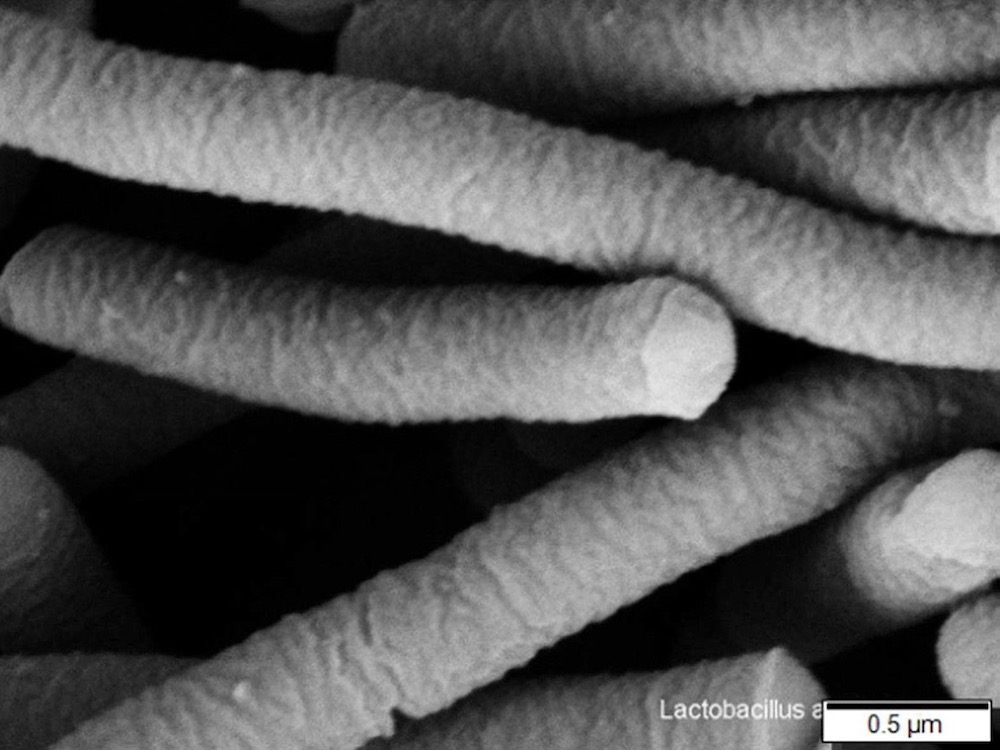
Probiotics bacteria under the microscope.
Lactobacillus Rhamnosus
Lactobacillus rhamnosus as “a powerfully beneficial non-colonizing bacterium that is part of the lactic acid producing genus,” adding that it is found in a wide array of probiotic supplements.
It has been used “to treat or prevent diarrhea caused by rotavirus and other viral illnesses in babies and children.” It also has been used by individuals suffering from Crohn’s disease, lactose intolerance, or vaginal yeast infections.
Lactobacillus Casei
This particular bacterium is found in the human intestine and mouth, and it has a wide pH and temperature range. It can aid in the digestion of carbohydrates.
It also has a reputation among many for reducing inflammation, which makes it especially beneficial when it comes to dealing with conditions such as arthritis.
Lactobacillus Johnsonii
This bacterium is referred to as a “vaginal bacteria” because it propagates largely in the female reproductive system.
As one probiotics manufacturer points out, it is included in the coating of a newborn upon delivery, and the child will ingest some of it, making it possible to better handle and digest breast milk.
Given that detail, it’s only natural that supplement manufacturers use it to combat digestive problems related to lactose intolerance.
Bifidobacteria
The function of Bifidobacteria is not unlike the other types on this list. The three “main” jobs include “breaking down foods, helping the body take in nutrients, and preventing the take-over of ‘bad’ bacteria.”
Any microorganisms that fall into this family will likely show up on supplemental products that claim to feature probiotics.
How to Maximize Probiotics Benefits
There are a few different ways that people take probiotics. Of course, the best way to do so is through the foods you consume in your everyday diet (fermented).
Popular selections high in probiotics include the following:
- Sauerkraut
- Yogurt
- Tempeh
- Kefir
- Kimchi
- Kombucha
- Miso
- Pickled Cucumber
- Nattō
- Microalgae
- Kvass
- Olives
- Apple Cider Vinegar
- Dark Chocolate (70% or higher)
The other most popular form for taking probiotics is through an enclosed capsule, which can be either refrigerated or non-refrigerated. There also are liquids and powder mixes that you may choose to incorporate.
Our recommendation: jump back and forth from one type to another every month or two.
Mixing it up could keep the bad bacteria off-guard so they’re never quite sure how to fend off an attack.
Are Probiotics Completely Safe?
It seems like a no-brainer of a question, but as we are about to see, there can be side effects. That said, for all intensive purposes, you’re not going to come to harm taking probiotics.
That’s because they are comprised of the healthily occurring bacteria that are already in your gut doing all of those things mentioned above. While effectiveness will vary, the strains of the bacteria themselves are safe to ingest.
Probiotics Benefits and Frequency: How Often Should You Take?
The number of probiotics that you take in a given day will vary greatly depending on the source, but just to give you an idea, take Culturelle’s capsule.
If you are age 12 or older, the company recommends taking one daily, and each capsule contains 10 billion “active cultures,” which is pretty solid for a probiotic product. But try not to get too hung up on the number of cultures advertised on the packaging.
While higher is better in theory, storage and the types of strains selected can make it difficult to know whether you’re getting the full effect whenever you pop a pill or throw down a beverage.
Many probiotics supplements require refrigeration at all times, so if you leave yours out overnight, you may find that your next dosage has pretty much a placebo effect.
The best recommendations to combat this:
- Follow the storage practices described on the packaging.
- Take each dose as directed.
- Don’t let a supplement “stand in” for consumption of probiotics through your diet. In other words, keep eating high-quality, fermented foods.
- Pay attention to the quality of your bowel movements and make note of any improvement (or lack of improvement).
When Should You Take Probiotics?
My general rule of thumb for taking a probiotic is, it never hurts to be sure.
While some will recommend never taking a supplement on an empty stomach, others will tell you to take it in between meals. While some will say “first thing in the morning,” others will say “before you go to bed at night.”
The when is not as important of a factor as the quality of the probiotic that you are putting into your body.
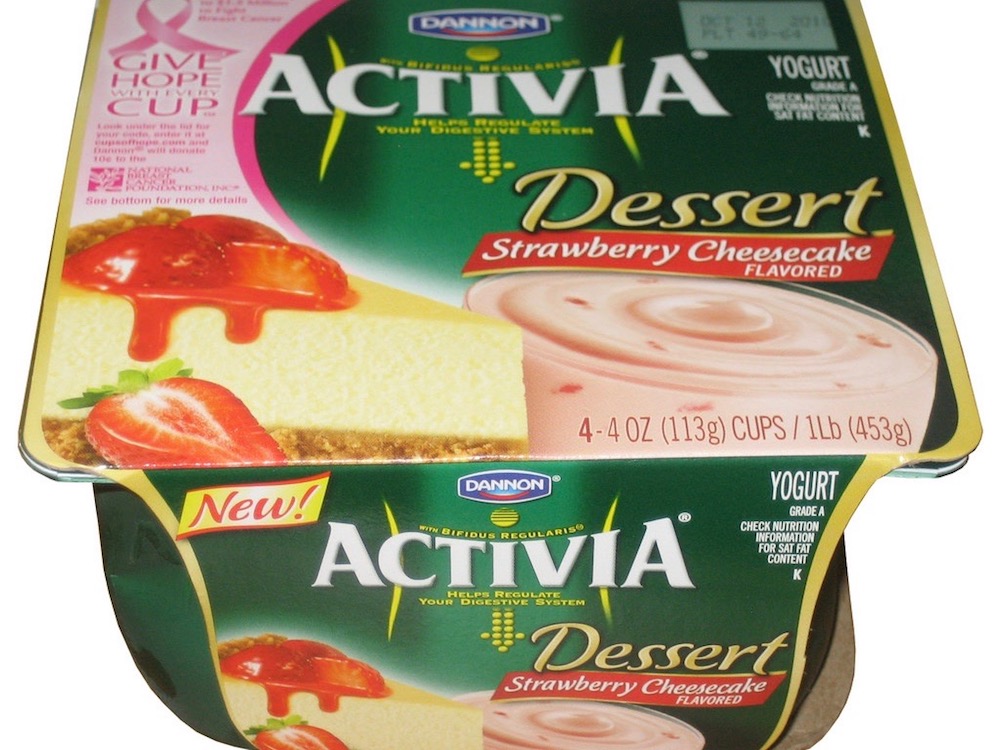
Probiotics are found in yogurt and other fermented foods.
So How Can You Tell The Quality?
So much of the answer to this question lies in personal experience. You have to be willing to experiment and give an honest assessment of the effects on your body. While some probiotics supplements can prove to be very expensive, others are highly affordable.
Recommendation: don’t assume that paying more will net you best results. In fact, if anything, I would go the opposite direction.
Start with a low-cost probiotic supplement. If you notice any changes for the better, stick with it.
If you are satisfied but still experiencing the occasional problem, consider upping the number of cultures and/or going with a more expensive option. If you are receiving no benefit, then try a product with a higher quality reputation.
And as previously suggested, don’t hone in on one single probiotic supplement and cease experimentation. You can come back to ones that you’ve tried in the past, but mix it up with a few other products as well.
What Are Best Storage Practices for a Probiotic Supplement?
As we have previously alluded to, probiotics have a reputation for being refrigerated products. The reason is that many of the strains of probiotics are sensitive to heat and can die off if left out for too long.
That may not kill all of the cultures, but it can certainly result in a less effective product if that’s the way the product was formulated.
Fortunately, the storage approach for refrigerated probiotics is not a difficult one. Most of the bottles are relatively small, and they should easily fit into a space on one of your refrigerator shelves.
Whatever the temp currently is (at least while the unit is functioning normally) should be cold enough to maintain the integrity of the cultures.
If you fear that integrity has been compromised by the storage conditions, don’t toss out the whole bottle. Instead try upping the dosage from one pill to two.
It is not going to kill you, and you shouldn’t even worry with it at all if you are still satisfied with the quality of your digestion.
Same rule applies when it comes to taking a probiotic that is slightly past the expiration date. The worst case scenario is that you take a capsule that isn’t as effective — or effective at all.
The best case scenario is that it still yields the results you’re hoping for. The middle-ground scenario is that you have to take two instead of one.
Now For The Side Effects…
Side effects of probiotics are minimal, but there have been reports, and they do exist. Healthline notes five of the most commonly occurring side effects here. You should read the whole article for specifics.
Erica Julson, the piece’s author, also is a registered dietary nutritionist and a certified laboratory technician (aka way smarter than moi on the topic), and the effects she has noticed include gas and bloating; headaches; increased histamine levels; and an increase in the risk of infection.
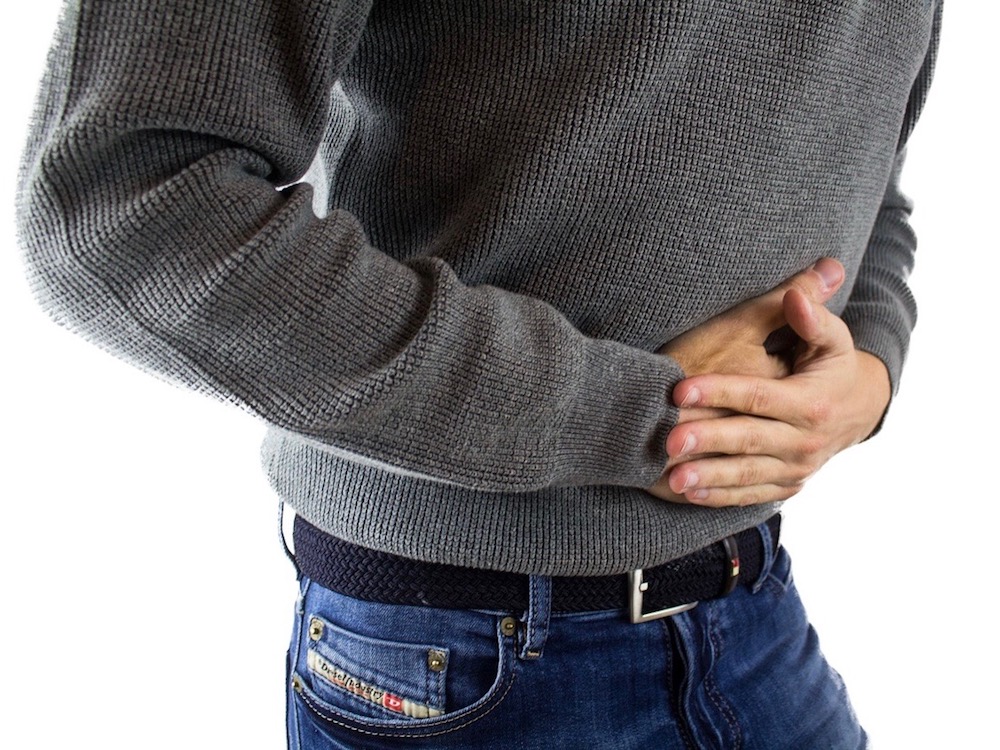
Probiotics in too great of a supply could lead to gas and bloating.
Other Steps You Can Take to Maximize Probiotics Benefits
Once more before signing off, it should be noted that we still have a lot to learn about probiotics from a scientific standpoint. We know they are not a specifically harmful substance, but we also know their effectiveness can vary from one person (and product) to the next.
Results also may be helped along by other actions you take. For example, as mentioned earlier, you will want to effectively manage your stress levels.
Poor gut health can lead to an increase in stress and poorly managed stress can lead to a worsening of gut health. It really is a vicious circle that you get in to, so try to limit your exposure to stressful situations and toxic people.
And if you can’t limit the exposure, then make sure that you find ways to decompress and recharge your batteries in the downtime.
Also, avoid toxic foods. Heavily processed foods, sugars, and anything fed with an antibiotic can reek havoc on your digestive system. When too much of these occur, probiotics can start to lose the fight for balance, and that leads to issues.
And lastly, take digestive enzymes. Probiotics create digestive enzymes, which help in the digestion of foods and processing of nutrients.
They share space in a healthy digestive system, and fortunately, it’s safe to take supplements for each if you need extra help that you are not getting from your daily diet.
In closing
From 2010 to 2014, the probiotics industry grew from $23.1 billion to $31.3 billion, a jump of more than 35%. While these products are no miracle cure for everything that ails you, numbers like these demonstrate that many of the people buying them believe they are receiving satisfactory results.
You may, and you may not. But thinking more about probiotics benefits can lead to you paying greater attention to what you are putting into your body. And once you take control of your gut health, you will notice other aspects of your health start to flourish.











Leave a Reply